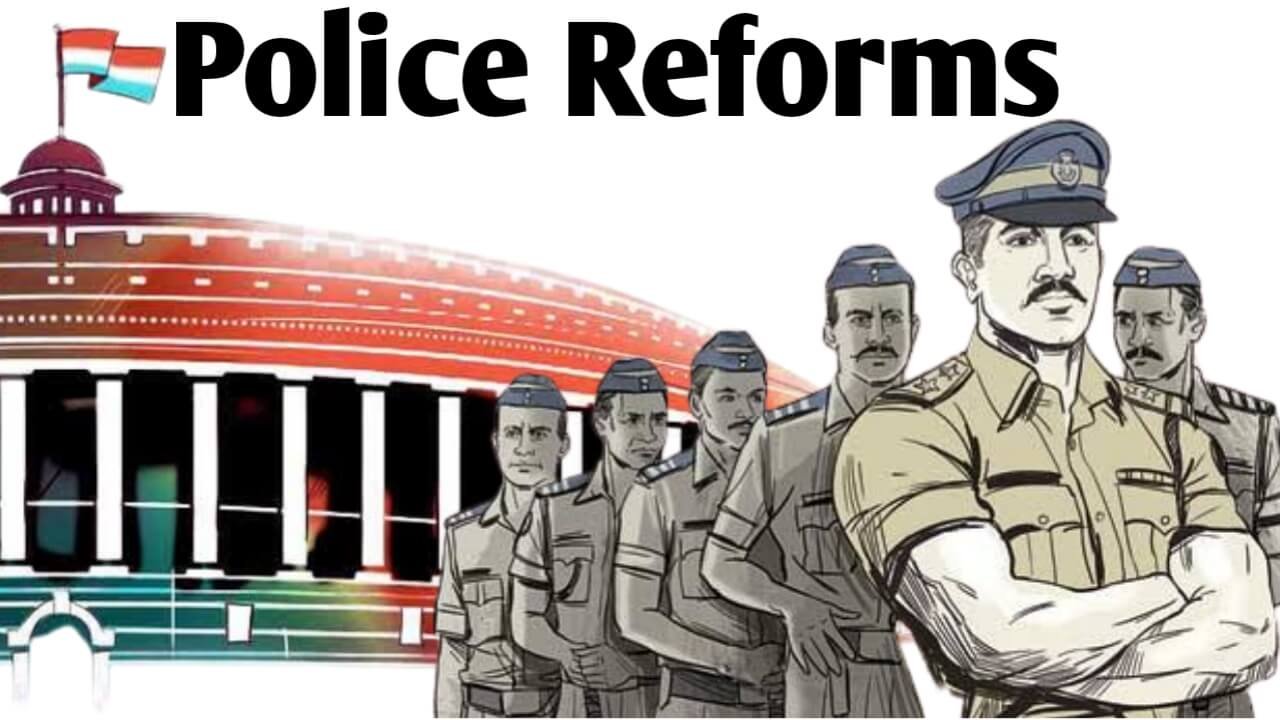Why in News?
- The Supreme Court recently observed that the 2022 incident of 4 Gujarat Police officers publicly flogging Muslim men after tying them to a pole in Kheda district for allegedly disrupting a garba event amounted to an “atrocity”.
- In this context, we will try to analyse the status of police reforms in India.
What’s in Today’s Article?
- Status of Police Reforms in India
- Issues in the Implementation of the Police Reform in India
- Committees/Commission on Police Reforms
- Way Ahead to Implement Police Reforms in India
- News Summary on the SC’s Observation in the Kheda Flogging Incident
Status of Police Reforms in India:
- Police reforms have been on the agenda of Governments almost since independence.
- But even after decades since India’s independence, the police are seen as selectively efficient, unsympathetic to the underprivileged.
- It is further accused of politicisation and criminalisation.
- In this regard, one needs to note that the basic framework for policing in India was made way back in 1861, with little changes thereafter.
- However, society has undergone dramatic changes. The public expectations from police have multiplied and newer forms of crime (like cybercrimes) have surfaced.
- Therefore, the policing system needs to be –
- Reformed to be in tune with present day scenarios and
- Upgraded to effectively deal with the crime and criminals, uphold human rights and safeguard the legitimate interests of one and all.
Issues in the Implementation of the Police Reform in India:
- Constitutional limitations of central govt: “Police” being a State subject in the 7th schedule to the Constitution of India, it is primarily the State govts who have to implement the various police reforms measures.
- Accountability to the political executive vs operational freedom.
- Significant vacancies within the state police forces, causing the remaining workforce to be overburdened.
- Issues related to qualifications and training,promotions and working conditions, etc.
- Inferior crime investigation: Crime investigation requires skills and training, time and resources, and adequate forensic capabilities and infrastructure.
- Inadequate police infrastructure: Modern policing requires a strong communication support, state-of-art or modern weapons, and a high degree of mobility.
- Unsatisfactory level of police-public relations: Police requires the confidence, cooperation and support of the community to prevent crime and disorder.
Committees/Commission on Police Reforms:
- The National Police Commission (1978-82): The NPC recommended to amend the Code of Criminal procedure 1973.
- The Padmanabhaiah Committee on restructuring of Police (2000): It suggests structural changes (to recruitment, training, involvement of public in crime prevention, etc) in the police to meet the new challenges.
- The Malimath Committee on reforms in Criminal Justice System (2002-03): Itsrecommendations pertain to –
- Strengthening of training infrastructure, forensic science laboratory,
- Enactment of new Police Act,
- Setting up of Central Law Enforcement agency to take care of federal crimes,
- Separation of investigation wing from the law-and-order wing in the police stations,
- Improvement in investigation by creating more posts,
- Establishment of the State Security Commission, etc.
- The Ribero Committee: It wasconstituted in 1998 on the directions of the SC (in Prakash Singh vs Union of India case) to –
- Review action taken by the Central Government/State Governments/UT Administrations in this regard, and
- Suggest ways and means for implementing the pending recommendations of the above Commission.
- The 7 Directives by SC (2006): The apex court gave its nearly revolutionary directions in 2006 (like constitute a State Security Commission, set up a Police Establishment Board, etc).
- The states and union territories were directed to comply with seven binding directives that would kick-start reform.
Way Ahead to Implement Police Reforms in India:
- The Model Police Act 2015emphasised on – Functional autonomy, Encouraging professionalism, Accountability paramount, Improved service conditions, etc.
- The Act provided for social responsibilities of the police and emphasised that the police would be governed by the principles of impartiality and human rights norms, with special attention on weaker sections including minorities.
News Summary on the SC’s Observation in the Kheda Flogging Incident:
- Background:
- The police officers had appealed to the SC against a Gujarat HC order sentencing them to 14 days’ imprisonment for contempt of court.
- The conduct of the four officers were found to be in contempt of the directions of the SC in the D.K. Basu judgement of 1996 against police abuse and custodial violence.
- The D.K. Basu verdict: It emphasised the strong need in a free society to protect individuals from torture and abuse by police and other law enforcement agents.
- SC’s observation in the Kheda flogging incident:
- Police is, no doubt, under a legal duty and has the legitimate right to arrest a criminal and to interrogate him during the investigation of an offence.
- But it must be remembered that the law does not permit use of third-degree methods or torture of accused in custody during interrogation and investigation with a view to solve the crime.




